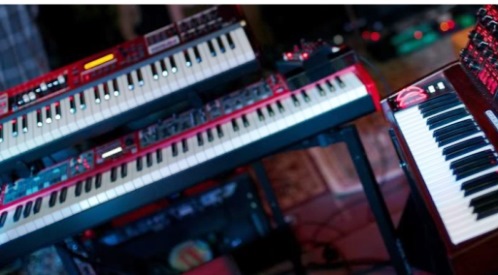
In pianos and other keyboard instruments, the touch of the keys matter to the players. There’s a wide range of keyboard instruments available today, and its easy to get confused when you hear terms like touch-sensitive keys, velocity keys, weighted keys, hammer action keys, etc. Here we decode this concept and try to explain the differences, in as simple manner as possible.
Touch-Sensitive is about how hard you hit
Touch-Sensitivity, also known as velocity sensitivity, refers to the ability of the keyboard instrument to understand how hard or how softly you have pressed the keys.
All the pianos produce a louder sound when pressed harder, and produce a softer sound when the keys are pressed softly (that is why a piano is also called pianoforte, piano means soft, forte means loud).
You can read more on Touch-sensitive (velocity-sensitive) keys here.
What about Weighted Keys?
So technically, touch-sensitivity and weighted keys are two different things.
Weighted keys is about how the keys feel on your fingers.
Traditionally, pianos had heavier keys as every key was linked to a mechanism behind that would generate the sound. They all are touch sensitive keys, but they feel a lot heavier than what you find on electronic keyboards.
Most low-end electronic keyboards are designed to be lighter and cheaper so they compromise on certain things like touch and weight of the keys.
As you go for the more expensive models (with weighted keys), the keys start resembling the ones on a real piano, in terms of touch and feel.
Weighted, Graded Hammer, and other Options
On a traditional acoustic piano, the keys are heavier (weighted), but they also have another characteristics – the keys are comparatively heavier on the left side and they become slightly lighter as you move on to the higher octaves.
The same is also implemented in the more expensive digital pianos.
Keyboards with weighted keys usually have 88-keys and they’re much heavier than keyboards that don’t have weighted keys. They are also more expensive.
Read: Various Piano Action Explained (Weighted, Hammer Action)
You need Weighted keys for Piano lessons
If you’re seriously learning to play the piano and are considering investing in an 88-key keyboard (a piano has 88 keys), you should buy a keyboard with 88 keys.
You will be able to play a wide range of pieces, especially the classical ones (some of which require more than 61 keys). The weighted keys are also great for strengthening your finger muscles.
But please note that its okay to start on a keyboard with 61-keys (5 octaves), if you’r a complete novice and all this is overwhelming you.
Read: Keyboard lessons vs Piano lessons.
Summary
- The cheapest keyboard will neither have touch-sensitive keys nor will the keys be weighted
- Then, you will find electronic piano keyboards that offer touch-sensitivity but not weighted keys
- Then, you will find keyboards with touch-sensitivity and semi-weighted keys
- Finally, you will find keyboards/pianos with touch-sensitivity keys and fully-weighted keys that mimic the keys on an acoustic piano.
Leave a Reply